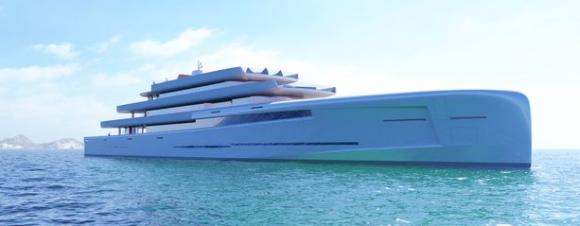 Italian boatbuilders Fincantieri and Dutch firm Van Geest Designs have developed a design of a 106 meter “Superyacht,” named Mirage, which would effectively become invisible at sea. The design features specially mirrored glass which is intended to reflect the image of the sea back to onlookers, making the yacht apparently vanish at distances over 50 meters.
Italian boatbuilders Fincantieri and Dutch firm Van Geest Designs have developed a design of a 106 meter “Superyacht,” named Mirage, which would effectively become invisible at sea. The design features specially mirrored glass which is intended to reflect the image of the sea back to onlookers, making the yacht apparently vanish at distances over 50 meters.
So far, the yacht is only a design. Designer Pieter Van Geest says that after working for over a year on the plans, the yacht itself would take three and a half years to construct. Mirage would cost an estimated £200 million.
Is this a brilliant concept or a really bad idea? The yacht would still appear as an AIS target and, barring additional stealth technology, would show up on radar. Still, if the yacht will not be visible at more than 50 meters away, wouldn’t that dramatically increase the risk of collision?
The other issue is that most rich folks seem to want to show off their yachts. It seems that to many yacht owning oligarchs and other billionaires, the size of their yachts is one way of implicitly bragging about the size of other endowments. I am not sure that the pitch “my penis is bigger than yours, but mine is invisible,” will sell many yachts.
Thanks to Alaric Bond for contributing to this post.

Only reason for invisible is for illegal activity. Drug lord test bed to see if it works, then apply it to smuggling.
A bad idea… assuming that anyone is actually looking out of their bridge windows 🙂
Stupid — yachts that size, that costly, are built to be admired or envied. Why hide when you can flaunt?
ha, good one, Rick!
yeah and definitely a weird (and stupid) idea.
Stupid and Meh. After reading the article it seems they are going for windows/glass mirrored on the outside for ‘privacy’ as no one has mirrored the outside of the glass used on yachts. Maybe they want Roman Abramovich to upgrade his latest silver and chrome yacht.
Common sense is always in shorter supply than money.
Common sense: “How many breakfasts can you eat?”
Money: “How many are for sale?”